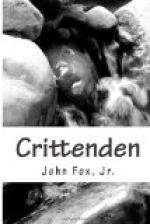That step had made him good in body and soul. It made him lean and tanned; it sharpened and strengthened his profile; it cleared his eye and settled his lips even more firmly. Tobacco and liquor were scarce, and from disuse he got a new sensation of mental clearness and physical cleanliness that was comforting and invigorating, and helped bring back the freshness of his boyhood.
For the first time in many years, his days were full of work and, asleep, awake, or at work, his hours were clock-like and steadied him into machine-like regularity. It was work of his hands, to be sure, and not even high work of that kind, but still it was work. And the measure of the self-respect that this fact alone brought him was worth it all. Already, his mind was taking character from his body. He was distinctly less morbid and he found himself thinking during those long days of the sail of what he should do after the war was over. His desire to get killed was gone, and it was slowly being forced on him that he had been priggish, pompous, self-absorbed, hair-splitting, lazy, good-for-nothing, when there was no need for him to be other than what he meant to be when he got back. And as for Judith, he felt the bitterness of gall for himself when he thought of her, and he never allowed himself to think of her except to absolve her, as he knew she would not absolve herself, and to curse himself heartily and bitterly. He understood now. It was just her thought of his faithfulness, her feeling of responsibility for him—the thought that she had not been as kind to him as she might have been (and she had always been kinder than he deserved)—all this had loosed her tears and her self-control, and had




